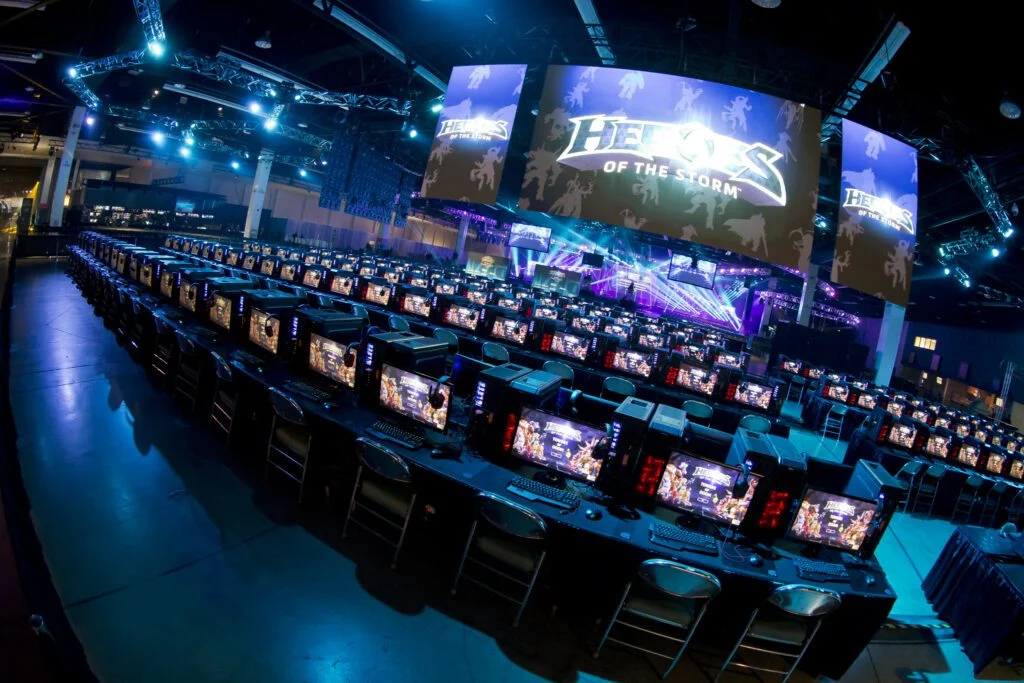Esports: The Rise of Competitive Gaming has seen a significant increase in popularity in recent years, with millions of fans tuning in to watch professional gamers compete in various video games. This competitive form of gaming has evolved into a global phenomenon, with large tournaments, professional teams, and substantial prize pools. Esports has also led to the development of a thriving industry, including sponsorships, advertising, and media coverage, further solidifying its place in the world of entertainment.
Competitive Gaming: The Emergence of Esports has captured the attention of a diverse audience, from hardcore gamers to casual spectators, as it offers an exciting and dynamic form of entertainment. The rapid growth of Esports has also sparked interest from investors and traditional sports organizations, who recognize its potential for significant financial gains and global influence. Additionally, the rise of Esports has brought about discussions regarding its recognition as a legitimate sport, as well as its impact on the gaming industry as a whole.
The Evolution of Esports
Esports, or electronic sports, have rapidly gained popularity over the past two decades, evolving from casual gaming competitions to professional, organized tournaments with massive prize pools. The rise of esports can be attributed to the increasing accessibility of technology, the growth of online gaming communities, and the development of competitive gaming platforms. As a result, esports has become a global phenomenon, attracting millions of viewers and generating substantial revenue for players, teams, and event organizers.
With the advent of streaming platforms like Twitch and YouTube Gaming, esports has become more accessible to a wider audience, allowing fans to watch live tournaments and connect with their favorite players and teams. Additionally, the integration of esports into mainstream media and the establishment of professional leagues, such as the Overwatch League and the League of Legends Championship Series, have solidified the industry’s legitimacy and further propelled its growth.
The Competitive Gaming Culture
The competitive gaming culture is characterized by a passionate community of players, fans, and content creators who are dedicated to the pursuit of excellence in their respective games. Esports events, whether held online or in arenas, foster a sense of camaraderie and sportsmanship among participants, creating a vibrant and inclusive environment. This culture celebrates skill, strategy, and teamwork, and it has given rise to a new generation of esports athletes who are admired for their dedication and talent.
Furthermore, the competitive gaming culture has spurred the development of esports organizations, training facilities, and educational programs aimed at nurturing the next wave of professional gamers. As a result, esports has become a viable career path for many individuals, offering opportunities for sponsorship, endorsements, and lucrative contracts with top teams. The competitive gaming culture continues to thrive, driven by the passion and enthusiasm of its community members.
The Spectator Experience
The spectator experience in esports has been transformed by advancements in technology and the growing demand for high-quality entertainment. Fans can now watch live tournaments in high definition, with professional commentary and analysis providing in-depth insights into the action. Additionally, virtual reality and augmented reality technologies are being utilized to enhance the viewing experience, allowing spectators to immerse themselves in the virtual world of their favorite games.
Esports events also offer a range of engaging activities for spectators, including meet-and-greets with players, merchandise booths, and interactive gaming zones. These experiences contribute to the overall appeal of esports tournaments, attracting diverse audiences and creating a sense of community among fans. As a result, the spectator experience in esports continues to evolve, offering new and innovative ways for fans to engage with the games and players they love.
The Business of Esports
The business of esports encompasses a wide range of revenue streams, including sponsorships, advertising, media rights, ticket sales, and merchandise. Major companies from various industries have recognized the potential of esports as a marketing platform and have invested significant resources in sponsoring teams and events. This has led to the professionalization of the industry, with top players and teams securing lucrative deals and endorsements.
Moreover, the growing viewership of esports has attracted the attention of media companies and broadcasters, leading to the acquisition of broadcasting rights for major tournaments and leagues. This has further solidified the financial viability of esports and has contributed to the industry’s rapid growth. As a result, the business of esports is now a multi-billion-dollar industry that continues to attract investment and innovation from both traditional and non-traditional sources.
The Future of Esports
The future of esports is poised for continued growth and innovation, driven by advancements in technology, the expansion of gaming communities, and the increasing mainstream acceptance of competitive gaming. Esports is likely to become more accessible to a global audience, with the potential for new markets to emerge in regions with a burgeoning interest in gaming and esports culture.
Furthermore, the convergence of esports with emerging technologies, such as virtual reality, artificial intelligence, and 5G connectivity, is expected to revolutionize the way games are played and experienced. This will open up new possibilities for immersive gameplay and interactive spectator experiences, shaping the future of esports as a cutting-edge form of entertainment. As esports continues to evolve, it is poised to solidify its position as a major player in the global entertainment industry.
The Impact on Gaming Industry
Esports has had a significant impact on the gaming industry, influencing game design, marketing strategies, and the overall landscape of digital entertainment. Developers are now designing games with competitive multiplayer modes and esports potential in mind, catering to the growing demand for engaging and competitive experiences. This has led to the creation of esports-specific titles and the integration of esports features into existing games.
Furthermore, the success of esports has prompted gaming companies to invest in the development of esports ecosystems, including leagues, tournaments, and dedicated platforms for competitive gaming. This has led to the professionalization of gaming as a whole, with a greater emphasis on skill-based competition and the recognition of top players as professional athletes. As a result, the impact of esports on the gaming industry is reshaping the way games are created, marketed, and consumed.
The Role of Esports in Education
Esports has begun to play a significant role in education, with schools and universities recognizing the value of competitive gaming as a platform for skill development and community engagement. Many educational institutions have established esports programs and clubs, providing students with opportunities to compete, collaborate, and develop valuable skills such as teamwork, communication, and strategic thinking.
Additionally, esports scholarships and academic programs focused on game design, esports management, and streaming have emerged, offering students a pathway to pursue their passion for gaming in a formal educational setting. The integration of esports into education has the potential to create new career pathways and opportunities for students who are passionate about gaming and esports, further legitimizing the industry as a viable and valuable pursuit.
The Social and Cultural Impact
Esports has had a profound social and cultural impact, bringing together individuals from diverse backgrounds and creating a sense of community and belonging. Gaming has become a shared experience that transcends geographical boundaries, connecting people through a common interest in competitive play and digital entertainment. This has led to the formation of vibrant online communities and offline events where fans can come together to celebrate their passion for gaming.
Furthermore, esports has challenged traditional perceptions of gaming and has elevated it to a form of entertainment that is celebrated and respected on a global scale. The success of esports athletes and the growing popularity of competitive gaming have inspired a new generation of players and fans, shaping the cultural landscape of gaming and establishing it as a mainstream form of entertainment. As a result, the social and cultural impact of esports continues to grow, influencing the way gaming is perceived and experienced around the world.
| What | Competitive gaming in the form of organized, multiplayer video game competitions. |
|---|---|
| When | Has been steadily growing in popularity since the early 2000s. |
| Where | Global, with major tournaments and leagues held in various countries. |
| Why | Due to advancements in technology, the widespread availability of high-speed internet, and the rise of streaming platforms. |
| How | Players and teams compete in a variety of video games, with huge prize pools and sponsorships at stake. |



